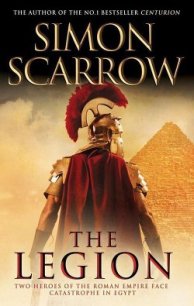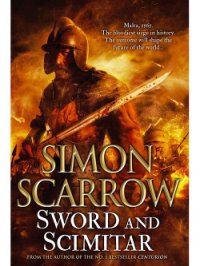Son of Spartacus - Scarrow Simon (книги онлайн полные версии .TXT) 📗
Жалоба
Напишите нам, и мы в срочном порядке примем меры.
Son of Spartacus - Scarrow Simon (книги онлайн полные версии .TXT) 📗 краткое содержание
Son of Spartacus читать онлайн бесплатно
Simon Scarrow
Son of Spartacus
1
The raiders came shortly after nightfall, emerging stealthily from the belt of cedar trees that stretched along the slopes of the hill above the villa. Over fifty of them, armed with a mixture of swords, spears and clubs. Some had armour: chain- mail or old bronze cuirasses, and helmets and shields in a wide variety of designs. Most of the men were thin and gaunt, used to a life of hard labour and perpetual hunger. Their leaders were different: powerfully built individuals who carried the scars of their profession. In contrast to the other men, their armour was ornately decorated and well cared for. Before they had escaped from their owners these men had once been gladiators — the most deadly fighters in all the lands ruled from Rome.
At the head of the small force rode a broad-shouldered man with tightly curled dark hair. He sat astride a fine black mare, part of the spoils of another villa attacked a month before. A livid white knot of tissue stretched across his brow and nose, the scar of a wound received only a few months earlier from a centurion in command of a patrol that had been ambushed. The patrol had been part of the force sent out from Rome to track down and eliminate the bands of brigands and runaway slaves who were hiding deep amid the Apennine mountains. Many of the fugitives were the survivors of the great rebellion led by the gladiator Spartacus some twelve years earlier, and they still carried his legacy close to their hearts. That revolt had nearly brought Rome to its knees and ever since the Romans had lived in fear of another bloody uprising. Thanks to the wars that they had been fighting outside Italia, it had not been possible to complete the destruction of the surviving rebels and over the years their numbers had swollen by thousands. Escaped slaves, together with those who had been set free by the rebels’ raids on the villas and farming estates owned by the richest men in Rome, now made up the large army of freedom fighters.
Soon, the leader reflected with a thin smile, they would be strong enough to carry out more ambitious attacks on their Roman masters. He had already made his plans. The time would come when once again a gladiator would lead an army of slaves against their oppressors. Until then, the leader was content to carry out small raids, such as the one this night, to unnerve the wealthy men who controlled Rome, and to inspire the oppressed slaves eking out their miserable lives in the houses, fields and mines stretching the length and breadth of Italia.
The leader's keen eyes scrutinized the dark shapes of the buildings and walls lying before them. For two days he and his men had been watching the villa from the shadows of the trees. It was typical of the farming estates owned by wealthy Romans. There was a grand house to one side, built round a courtyard within which neat flower beds and gravel paths ran round pools and fishponds. A wall separated the house from the low, plain buildings where the slaves, overseers, guards and agricultural tools were accommodated along with the granaries and store-houses where the produce of the estate was amassed before it was sent to market. The resulting profit would be added to the fortune of the owner living in Rome, heedless of the sweat, toil and suffering of those who made him rich. Round the whole collection of buildings ran a ten-foot wall, built to keep the slaves in and any threats out.
As they had lain in concealment, the raiders had noted the routines of the villa and the coming and going of the chain-gangs and their guards as they worked the fields and groves that surrounded the complex of buildings. The leader’s rage had burned in his veins as he watched the overseers cracking their whips and using their clubs to beat the slaves who moved too slowly. He would have liked to charge his men down from the trees there and then to cut down the guards and set the slaves free, but he had learned the value of patience. It was a lesson that Spartacus had taught him many years before.
The first thing in any fight was to watch your enemy closely and learn his strengths and weaknesses. Only a fool launched k himself into a fight without such preparation, Spartacus had insisted. So the leader and his men had waited, noting the times when the guards had been changed on the walls and gate of t the villa. They had counted the guards, how they were armed and which building in the compound served as their barracks. They had also discovered a small section of the wall that was cracked and crumbling behind a spruce tree, barely visible from The men on watch rarely passed by that section of the wall, and that was where the raiders would strike.
Now they moved silently across a freshly ploughed field and into a square grove of olive trees close to the outer wall of the villa. Ahead, the leader could see the bright flames of the brazier burning above the gatehouse, providing illumination for the guards, and warmth on this cold January night. Smaller flames flickered in the darkness atop the watchtowers at each comer of the wall, and the figures of the lookouts were visible as they huddled in their cloaks and stamped their booted feet to stay warm, their spears resting against their shoulders.
‘Slowly now.’ the leader murmured over his shoulder. ‘No sound. No quick movements.’
His order was relayed in whisper from man to man as the raiders crept through the trees and approached the damaged section of the wall. The leader held up his hand as they reached the edge of the grove, and his men stood still. Then, beckoning to six of the nearest raiders, the leader dismounted and handed the reins of his horse to one of his men. He undid the clasp of his cloak and laid it across the saddle. It would be foolhardy to enter a fight encumbered by the thick woollen folds. Underneath the cloak he was wearing a dark blue tunic with a black leather breastplate inlaid with the silver motif of a wolf’s head. A short sword hung from a baldric across his shoulders and his forearms were protected by studded leather bracers.
He turned to the others. ‘Ready?’
They nodded. ‘Yes, Brixus.’
‘Then let’s go.’
He stepped cautiously out of the treeline into open ground. The spruce tree loomed tall and dark seventy paces away. A small watchtower was the same distance further along the wall and a lookout stood black against the glow from the brazier behind him. Brixus stepped out and crossed the grass towards the wall. He limped as he walked, the result of an injury to his hamstring many years earlier in his last arena fight. The small party of men slipped out from the trees and followed him, stealing across the ground like shadows. Only the faintest rustling of grass accompanied their progress and soon they were beneath the scented boughs of the spruce tree, beside the wall.
‘Taurus, by the wall,’ Brixus whispered, and a huge figure I leaned his back against the plastered surface and braced his boots in the soil as he cupped his hands. At once one of his companions, Pindar, a lithe, tall man, jumped up, and with a Taurus lifted him towards the top of the wall. His companion quickly worked a brick loose and passed it down to one of the men waiting below. The brick was carefully lowered to the ground and then the next was passed down. Soon Pindar had removed all the bricks that had worked loose and had to pull out his dagger to work at the mortar holding the others in place. The work proceeded slowly and the leader limped out a short distance, then knelt down to keep watch on the man at the lookout tower. He still stood there, hands out, warming them over the flames of the brazier. Eventually he took his spear and slowly paced along the wall in the direction of the fugitives.





